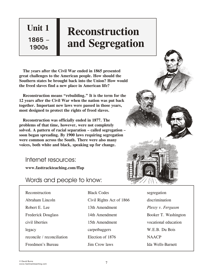| Unit 1:
Reconstruction and Segregation Frameworks for America's Past |
 |
| Unit 1:
Reconstruction and Segregation Frameworks for America's Past |
 |
 |
Click
on the links below -
|
||||||
| Historical
photo sets |
1.
The Civil War ends -
Reconstruction begins 2. Reconstruction problems and policies 3. The Reconstruction Amendments (13th, 14th, 15th) 4. Reconstruction ends in 1877 5. Segregation, Jim Crow laws, and the Plessy case 6. African American leaders' response to segregation |
||||||
| History food feature | Baking
shortnin' bread the old fashioned way |
||||||
| Exploring
further |
From primary sources: Voices of Reconstruction | ||||||
| Videos
and Internet sites  Students: Check with your parents for permission before visiting Internet links. |
Abraham Lincoln
(a short video about the president and his leadership during the Civil
War) Robert E. Lee mini-bio (a short video about this famous Southern military leader in the Civil War) Frederick Douglass House (the Internet site for his home in Washington, D.C., now a national park and museum) Booker T. Washington mini-bio (a short video about his life and ideas. Another interesting video about this great man from Virginia is here.) W.E.B. Du Bois mini-bio (a short video) Ida Wells-Barnett biography (a short video about the famous black woman, whose name was Ida B. Wells before her marriage) Music: Swing Low, Sweet Chariot Many American spirituals like this one grew out of African American life in the South during the 1800s. They usually have references to stories or phrases in the Bible. For example, lyrics about crossing over the Jordan River represent dying or going to Heaven. |
||||||
| Consider also: |
America:
The Story of Us TV
mini-series, Episode 5, "Civil War." The last ten minutes of this
episode will give your students a dramatic review of key events in the
last year of the war, including Lee's surrender and Lincoln's
assassination. This widely
praised production originally ran on the History Channel. Less
than $20 on Amazon for the 3 DVD set. Up From Slavery The famous and inspiring autobiography by Booker T. Washington, written in 1901. Click on the full screen icon, then click to turn the pages as you read this free online edition. Negro Progress in Virginia An interesting speech given in Richmond, Virginia, in 1913 by Booker T. Washington, illustrated with old photographs. From the National Humanities Center - it downloads as a PDF file to open and read on your computer or print. |
|
Copyright Notice
Copyright 2009, 2022 by David Burns. All rights reserved. As a guide to the Virginia Standards of Learning, some pages necessarily include phrases or sentences from that document, which is available online from the Virginia Department of Education. The author's copyright extends to the original text and graphics, unique design and layout, and related material. |